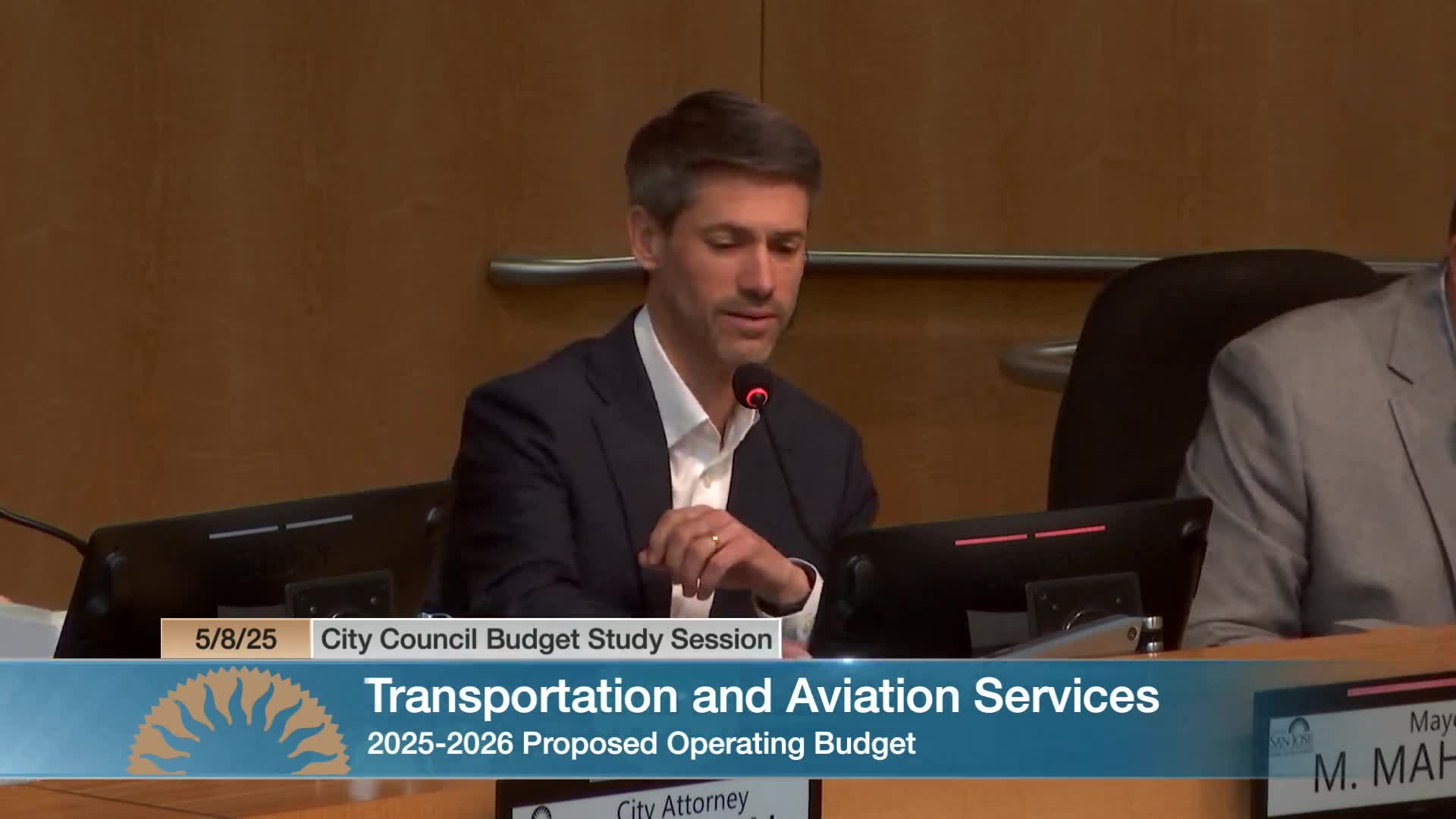San Jose council hears budget update; $8.5 million speed‑camera grant frozen, pavement funding faces cliff
Get AI-powered insights, summaries, and transcripts
Subscribe
Summary
Councilors pressed Transportation and Aviation staff on a frozen $8.5 million federal grant for a speed‑camera pilot, a proposed $1 million allocation to repair street lights after copper‑wire thefts, and a two‑year funding cliff in pavement financing that could cut program capacity about 40% after 2028–29.
San Jose transportation and aviation officials told the City Council on May 8 that a planned speed‑camera pilot is paused while an $8,500,000 federal grant remains frozen, that crews are repairing roughly 800 of about 1,600 street lights knocked out by recent copper‑wire thefts, and that a key local pavement funding source will drop off in two years, threatening a long‑running repaving program.
The updates came during a budget study session in which John Risto, director of surface transportation, Mookie Patel, aviation director, and Jim Shannon, the city's budget director, reviewed Transportation and Aviation Services' performance measures and proposed budget moves.
Why it matters: the frozen federal grant directly affects the timing of a state‑authorized speed‑camera pilot that San Jose won approval to operate; pavement funding affects hundreds of miles of local streets and the city's pavement condition index; and copper thefts have created concentrated safety and visibility problems in some neighborhoods.
John Risto said the city is “99% done” with procurement for the speed‑camera vendor but that implementation is on hold while the federal grant is frozen. “We did receive a federal grant of $8,500,000 to help with the first start up of this project, and it is frozen right now by the federal government,” Risto said. He told councilors the administration is watching whether the grant will be released and has discussed a phased Plan B if the funds do not materialize.
Vice Mayor Foley and other council members urged a quicker shift to contingency funding if federal disbursement remains blocked. Foley noted the pilot is time‑limited and said the council would press the state to extend the pilot window if federal funds remain unavailable; Risto said staff had been asked to “give it a month” to see if the federal funds free up and that a phased installation remains an option.
Councilors also pressed Risto about a surge in copper‑wire thefts that left about 1,600 street lights out at one point. Risto said crews and contractors have restored roughly half and that the department proposed a $1 million capital allocation to accelerate repairs. “We do have a budget proposal in for a million dollars to actually help us catch up with those repairs,” Risto said, adding that arrests are being pursued by police and that enforcement remains a priority.
On pavement, Risto and Budget Director Jim Shannon described a steady multi‑year improvement in the pavement condition index (PCI) — from about 63 in 2014 to roughly the mid‑70s today — driven by prior voter measures and regional funds. But staff warned that the city's Measure T bond funds will end in roughly two years, which the presentation said would reduce pavement program funding by about 40% after 2028–29. Risto cautioned that the city has “another 2 years of a very robust pavement program” but that the PCI will likely decline thereafter unless new funding is secured.
Council member concerns ranged from how to prioritize remaining repairs near seniors and people with disabilities to whether the city should put a new measure before voters. Risto said staff are monitoring regional funding efforts and will return with options; Shannon said performance targets were set to be achievable within projected resources for next year.
On parking enforcement, Risto described a retooled approach to extended‑stay and abandoned vehicles: instead of the existing extended‑stay enforcement, staff proposed a targeted program using automated license‑plate readers to identify unregistered vehicles and a dedicated enforcement team to address them. “We're going after registered, unregistered vehicles throughout the city with a program to try to rectify that problem,” Risto said.
Aviation director Mookie Patel said airport customer satisfaction and cleanliness measures are improving modestly and that retail and tenant work inside Terminal B — including art installations administered by the Office of Economic Development and Cultural Affairs — may affect passenger perceptions while construction continues. Patel also reported softer passenger demand this year compared with earlier seasons, attributing declines to statewide travel softness and schedule changes by carriers.
What’s next: staff said they will return with updated funding options and more detailed program timing if the federal grant remains frozen. Councilors asked for clearer public communications on any delays and for contingency plans should the federal funding not be released.
Sources: city staff presentations and council Q&A during the May 8 budget study session.
